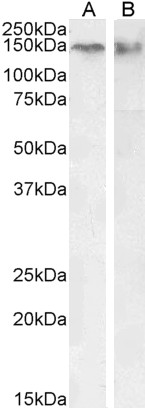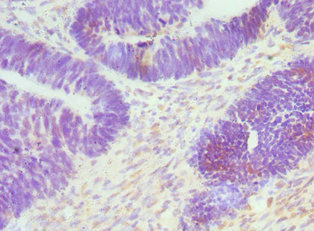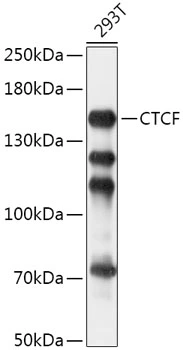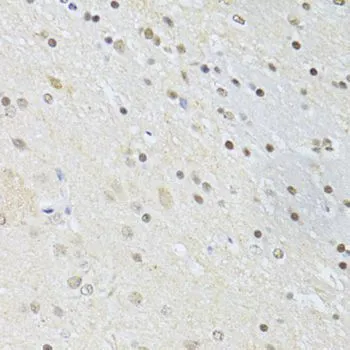![WB analysis of A31 (1), MCF-7 (2), HeLa (3), HCT116 (4), Jurkat (5), NIH3T3 (6), and Cos7 (7) cell lysate using GTX80397 CTCF antibody [1D11]. WB analysis of A31 (1), MCF-7 (2), HeLa (3), HCT116 (4), Jurkat (5), NIH3T3 (6), and Cos7 (7) cell lysate using GTX80397 CTCF antibody [1D11].](https://www.genetex.com/upload/website/prouct_img/normal/GTX80397/GTX80397_20170912_WB_w_23061322_712.webp)
WB analysis of A31 (1), MCF-7 (2), HeLa (3), HCT116 (4), Jurkat (5), NIH3T3 (6), and Cos7 (7) cell lysate using GTX80397 CTCF antibody [1D11].
CTCF antibody [1D11]
GTX80397
ApplicationsWestern Blot, ELISA
Product group Antibodies
ReactivityHuman, Monkey, Mouse
TargetCTCF
Overview
- SupplierGeneTex
- Product NameCTCF antibody [1D11]
- Delivery Days Customer9
- Application Supplier NoteWB: 1/500 - 1/2000. ELISA: 1/10000. *Optimal dilutions/concentrations should be determined by the researcher.Not tested in other applications.
- ApplicationsWestern Blot, ELISA
- CertificationResearch Use Only
- ClonalityMonoclonal
- Clone ID1D11
- ConjugateUnconjugated
- Gene ID10664
- Target nameCTCF
- Target descriptionCCCTC-binding factor
- Target synonymsCFAP108, FAP108, MRD21, transcriptional repressor CTCF, 11 zinc finger transcriptional repressor, 11-zinc finger protein, CCCTC-binding factor (zinc finger protein), CTCFL paralog
- HostMouse
- IsotypeIgG1
- Protein IDP49711
- Protein NameTranscriptional repressor CTCF
- Scientific DescriptionThis gene is a member of the BORIS + CTCF gene family and encodes a transcriptional regulator protein with 11 highly conserved zinc finger (ZF) domains. This nuclear protein is able to use different combinations of the ZF domains to bind different DNA target sequences and proteins. Depending upon the context of the site, the protein can bind a histone acetyltransferase (HAT)-containing complex and function as a transcriptional activator or bind a histone deacetylase (HDAC)-containing complex and function as a transcriptional repressor. If the protein is bound to a transcriptional insulator element, it can block communication between enhancers and upstream promoters, thereby regulating imprinted expression. Mutations in this gene have been associated with invasive breast cancers, prostate cancers, and Wilms tumors. Alternatively spliced transcript variants encoding different isoforms have been found for this gene. [provided by RefSeq, Jul 2010]
- ReactivityHuman, Monkey, Mouse
- Storage Instruction-20°C or -80°C,2°C to 8°C
- UNSPSC41116161








